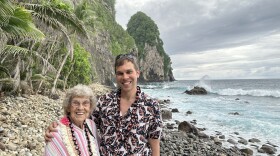
Ari Daniel
Ari Daniel is a reporter for NPR's Science desk where he covers global health and development.
Ari has always been drawn to science and the natural world. As a graduate student, Ari trained gray seal pups (Halichoerus grypus) for his Master's degree in animal behavior at the University of St. Andrews, and helped tag wild Norwegian killer whales (Orcinus orca) for his Ph.D. in biological oceanography at MIT and the Woods Hole Oceanographic Institution. For more than a decade, as a science reporter and multimedia producer, Ari has interviewed a species he's better equipped to understand – Homo sapiens.
Over the years, Ari has reported across five continents on science topics ranging from astronomy to zooxanthellae. His radio pieces have aired on NPR, The World, Radiolab, Here & Now, and Living on Earth. Ari formerly worked as the Senior Digital Producer at NOVA where he helped oversee the production of the show's digital video content. He is a co-recipient of the AAAS Kavli Science Journalism Gold Award for his stories on glaciers and climate change in Greenland and Iceland.
In the fifth grade, Ari won the "Most Contagious Smile" award.
-
The disease known as sleeping sickness is on the decline but remains a concern in Africa. Now there's a theatrical event aimed at keeping the numbers down.
-
A 125-million-year-old fossil from the early Cretaceous shows the skeletons of a smaller mammal biting a larger horned dinosaur, suggesting a much more complex ancient food web.
-
A new study takes a comprehensive look at the plastic debris smothering reefs, where in the ocean it's more prevalent — and how to deal with the problem.
-
That's a community-wide game Edgard Gouveia remembers from his boyhood in Brazil — and uses as a model in his efforts to heal the world through gameplay.
-
Nassim Haddad has seen his share of woe. At 79, he says of his philosophy: "I start again from the beginning. I [am not] afraid from anything." It also helps that he believes he was "born laughing."
-
A new study of astronaut blood finds that space travel reduces the expression of 100 genes related to the immune system.
-
A new study of astronaut blood finds that space travel alters gene expression in a way that impacts the immune system.
-
The California two-spot octopus can edit the RNA in its brain to produce different proteins as ocean temperatures fluctuate, a new study finds.
-
Grandma Joy Ryan, the 93-year-old behind @grandmajoysroadtrip on Instagram, says she's the "oldest old lady to ever visit every national park."
-
A 93-year-old grandmother and her 42-year-old grandson just finished a tour of all 63 U.S. national parks. They became internet celebrities along the way.








